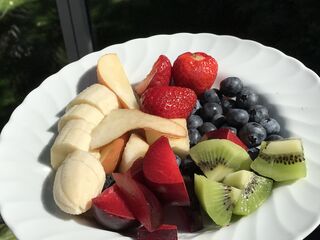Key points
- Psychologists have often studied the negative aspects of appetite, but food is linked to some of our most positive experiences.
- Our ancestors devoted a major portion of their lives to gathering, preparing, and sharing food
- Preparing your own food can enhance both physical and emotional health.
- Preparing food can lead to hedonic well-being, self-actualization, and meaning in life.
One pleasant evening in Vancouver, I enjoyed a spicy Chinese dinner with a small group of psychologists, including Paul Rozin. Rozin is a professor at the University of Pennsylvania who, besides being an entertaining dinner companion, has studied various aspects of the psychology of food. He coined the term “omnivore’s dilemma,” which became the title of a best-selling book by Michael Pollan. The dilemma is that eating a diverse array of novel foods makes it easy to find calories but also opens up the danger of eating something toxic (some mushrooms and berries are delicacies; some are deadly).
Rozin has argued that psychologists have historically either ignored the importance of food or have focused on the negative side of appetites, such as hunger, overeating, and eating disorders. But he makes a convincing case that food is intrinsically connected to much of human existence—parent-child relationships, friendships, status, mating, and even moral judgments.
Going a step further, anthropologist Richard Wrangham, in his book Catching Fire, argued that “cooking made us human”—shaping sex differences, social relationships, and human emotions, as well as freeing up time for our ancestors to be creative and inventive. I discussed Wrangham’s book here earlier.

Even with the efficiencies of cooking, our ancestors spent a lot of time foraging for food (that’s what hunting and gathering are all about, of course). With supermarkets and refrigerators, it’s a lot easier these days. Saturday, I spent a couple of hours foraging for food at the local hipster market, leaving me free to spend several hours in elaborate food preparations on Sunday.
Most days, I spend over an hour preparing breakfast—a fruit bowl that may include blueberries, raspberries, blackberries, strawberries, papayas, plums, pears, mangoes, kiwi, pineapple, and bananas, followed by a frittata made with chopped kale, swiss chard, garlic, pepper jack cheese, and turkey bacon, all consumed with a delicious cup of creamed coffee brewed with four kinds of fancy fresh ground beans in an espresso maker.
Then later that same day, I spent a couple more hours chopping several kinds of spicy peppers, onions, scallions, garlic, limes, and avocado for an improvised version of pozole, replacing the usual pork with fish. To accompany the pozole, my wife had baked a visually gorgeous and incredibly tasty loaf of sourdough bread (with the crunchy crust and delicate interior crumb you’d be delighted to stumble upon in an upscale New York bakery).
Was I wasting time in the kitchen that could have been better spent doing something “constructive”? Well, between hours in the kitchen, I spent a couple of hours researching the psychology of food and pondering the connection between eating and other human motives. It turns out that cooking can be a key to self-fulfillment in at least five ways.
1. Cooking can make you healthier, physically and psychologically.
A recent article by Farmer and Cotter (2021) reviews a number of studies linking food to various aspects of physical and mental health. Compared to those who eat a lot of highly processed foods (such as sweetened breakfast cereals, white bread, and frappuccinos), those who make their own food from scratch are more likely to eat fruits and vegetables. Your mother was right: Fruits and vegetables are good for you, associated with benefits for your heart, lower rates of obesity and diabetes, and even lowering the risk of some kinds of cancer (all those flavonoids, carotenoids, and various other vitamins and minerals turn out to be fairly essential to a long and healthy life).
And apparently, there is also evidence that besides nurturing your body, a healthy diet is also good for your mind. For example, eating a Mediterranean diet seems to be related to reduced depression and anxiety.
2. Cooking can improve your relationships.
If I make a delicious dish, such as cioppino (an Italian seafood dish, my version of which includes fish, shrimp, scallops, clams, mussels, anchovies, and sardines, all cooked up in a stew of tomatoes, garlic, shallots, finely chopped carrots, olive oil, clam juice, and red wine), I want to share it. In traditional societies, finding food, preparing it, and sharing it with family members and neighbors took up much of people’s lives and cemented their cooperative networks. In the modern world, a good meal can still cement our Platonic friendships and can fuel a new romantic relationship or nurture an existing one.
3. Cooking can give you a sense of self-actualization.
Research I reported here earlier suggests that self-actualization is associated primarily with status and secondarily with affiliation. If you develop your technical or artistic skills, you will not only feel a personal sense of competence, but other people will reward you with respect and prestige.
Mastering the art and science of cooking is a great way to get some respect and appreciation. At the highest level, master chefs such as Alice Waters, Thomas Keller, Bobby Flay, and Nigella Lawson win more reverence than most successful world leaders and other celebrities, coming in just South of the Buddha on the admiration dimension. If you want to geek out on the fascinating scientific side of cooking, incidentally, see Harold McGee’s 2004 book, On food and cooking (citation below).
4. Preparing food improves hedonic well-being.
Hedonic well-being refers to a sense that your life is filled with a good ratio of pleasure to pain. Preparing a nice meal, when you allow yourself the time to do it right, is rich in pleasures. There are the beautiful colors of fresh fruits (see the picture above), the aromas of garlic and onion sizzling in olive oil, the visual spectacle of a nicely arranged plate of diverse vegetables, seafood, and sauces, and then the sheer pleasure of tasting all those spicy and fragrant delicacies as they reach your tongue. Just reading through a good cookbook, and looking at the pretty pictures, is a fabulous form of hedonic self-indulgence.
5. Food can bring a sense of meaning to life.
Besides self-actualization and hedonic well-being, positive psychologists also distinguish eudaemonic well-being—or a sense of meaning in life. In research I conducted with Jaimie Krems (now at Oklahoma State) and Becca Neel (now at the University of Toronto), we found that people linked meaning in life most closely to taking care of their kin and being with friends. In another project headed by Ahra Ko and including a team of 40 researchers from around the world, we found that people universally rate caring for kin and maintaining their long-term relationships as their highest priorities. What better way to express those family values than by preparing a nice meal for your loved ones?
But I have to go now. There’s some leftover seafood pozole and sourdough bread that is waiting to carry me up to a higher level of self-fulfillment.





